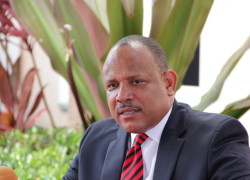
The Ministry of Health has advised the public of an ongoing investigation by the public health team into a case involving a four-year-old child tourist, suspected of having measles. The Bahamas had its first case of measles back in 1997, according Minister of Health, Dr. Duane Sands.
A release from the ministry indicated that on February 18th, the ministry was notified of a child visiting a private health care facility in the capital with “fever, red eyes, coryza and rash”.
Medical history presented by the parents excluded the measles, mumps and rubella (MMR) immunizations.
Dr. Sands said, “We used to have 95 per cent measles, mumps, and rubella coverage in The Bahamas. We’ve lost that, and we have restarted efforts to regain that coverage by going after the 10,000 or 15,000 kids who , for whatever reason, have not been vaccinated.”
The child is now receiving required care, is doing well and is expected to recover fully, according to the ministry.
Dr. Sands told The Journal that the country must be on alert, adding that The Bahamas has to be concerned with the issues of neighboring countries.
He said, “people move, and what we need to do is to double down on tried and tested public health strategies.”
The Ministry of Health reminded parents to ensure that children present for scheduled immunizations to keep them protected from preventable illnesses such as measles.
Dr. Sands said, “with the Anti-Vaccination Campaign and those deciding not to vaccinate their children because it’s fashionable or worried about the side effects; we have watched the re-emergence of these diseases which were once eliminated.
“There were more than 100,000 people that would have died from measles in the world last year. So, this give us great reason to be concerned.”, he added.
Results from tests taken are expected to be available within the next few days, at which time the ministry indicated that they will provide an update.
In response, the ministry also plans to conduct a campaign targeting all children ten years and younger as well as front line workers such as police, customs and immigration officers, health care workers and hospitality industry workers.
The aim is to increase the national MMR coverage in children and persons at highest risk for exposure.


